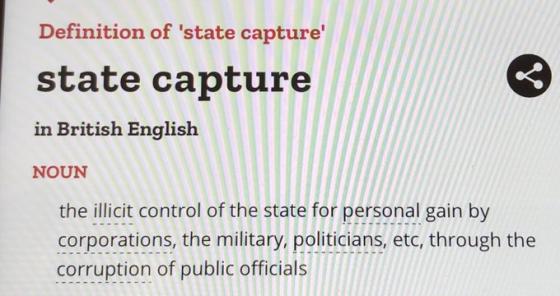Liberia: State Capture Is A Dangerous Development that Must Be Stopped

Definition of 'state capture'
... State Capture is indeed a dangerous development in our march to sustained peace and democracy for it creates and accentuates a disconnect between the people and their leaders, which could easily lead to conflict. It must be avoided at all costs.
According to Wikipedia, state capture is a type of political corruption in which private interests significantly influence a state’s decision-making processes to their own advantage. The term was first used by the World Bank around the year 2000. It was specifically applied to situations where small corrupt groups use their influence over government officials to appropriate government making-decision in order to strengthen their own economic positions
Such has been the perennial case of Liberia where a few individuals with access to power use such power to feather their nests. Prior to now for example, nearly every one of such individuals currently dominating the political landscape were economic and political nobodies. But today they have become rich not by dint of hard work but by sudden flight.
They cut all kinds of deals, even if such deals are detrimental to national interests. A case in point is that of the Liberia Petroleum Refining Company (LPRC). For the benefit of the public, LPRC is nothing more than a glorified petroleum storage facility and is no longer involved in the refining of petroleum products. Its oil storage tanks were built to store refined petroleum products but since refining operations ceased well over 25 years ago, the facility (LPRC Tank Farm) has since been used to store petroleum products for various importers.
During the reign of President Sirleaf, the practice by the management of LPRC awarding overdraft facilities/arrangements to oil importers for oil it (LPRC) did not own was well established over drafts worth thousands of dollars’ worth of petroleum products were awarded to select individuals/firms.
It can be recalled that sometime ago, media reports were rife about very large quantities of petroleum products gone missing from the LPRC storage tanks. Some importers were complaining that balances reflected on the books did not correspond with the actual fuel available in the LPRC storage tanks.
And because importers were displaying strong reluctance to place new orders for fuel imports, a shortage had ensued. The Russo-Ukrainian war had driven up oil prices globally and Liberia was no exception. Naturally, the price of petroleum products on the local market went up sharply.
That was about a little over two months ago. Then oil importers had made representations to government seeking to implement a hike in prices of the commodity especially on diesel (fuel), which currently sells at US$7.00 per gallon. But the price hike induced shortages of the products on the local market.
Meanwhile profiteers taking advantage of the situation moved in quickly to exploit the situation. According to informed sources, a syndicate involving LPRC officials and some importers were illegally and surreptitiously trucking fuel across the border into Guinea, where it fetches a much higher price.
And then came the shocker making headlines in the news: Petro Trade, an oil importing outfit that thousands of gallons of its products had disappeared or remained unaccounted for. But according to informed sources, the announcement was a mere ruse intended to deceive public opinion into believing that Petro Trade had indeed been a victim of theft.
Further, according to informed sources, Petro Trade, allegedly acting in concert with some top officials including legislators, amongst them a well-known senator, had conspired to keep the price of diesel fuel at US$7.00 per gallon rather than at US$5.00 — the current global market price.
Altogether, according to informed sources, in order to compensate Petro Trade for the self-declared disappearance of its products from the LPRC storage facility, only the Petro Trade will be allowed to import diesel fuel and the US$2.00 it reaps on every gallon of diesel is split between a certain senator (name withheld), the Lebanese importer (Petro Trade) and a very top official (name also withheld).
Altogether according to sources, the Lebanese importer, the senator and a very high official of government stand to reap a whopping US$50 million from the deal. Meanwhile the ordinary Liberian is unfairly left to contend with rising prices of commodities on the local market amid an acute lack of social services or a national safety net.
This kind of activity appears indistinguishable and analogous to raw state capture by a few individuals in positions of authority and influence. Just about everything is going wrong or appears wrong in the country. The economic hardships on the people may not be alleviated anytime soon according to a well-known Liberian former diplomat.
Lest it be forgotten, the developments unfolding in neighboring Sierra Leone should prove instructive especially for the national leadership. The recurring theme of their protests is corruption — official corruption that is. And the protests, according to political observers, are indicative of how a people challenged by poverty and official state corruption can out of desperation take matters into their own hands.
Our national leadership, it appears, seems far removed from the realities of daily existence; thus it would not be surprising should it be caught off guard as was the case in Sierra Leone recently when war was virtually raging in the streets, while its leader was vacationing abroad.
State Capture is indeed a dangerous development in our march to sustained peace and democracy for it creates and accentuates a disconnect between the people and their leaders, which could easily lead to conflict. It must be avoided at all costs.
